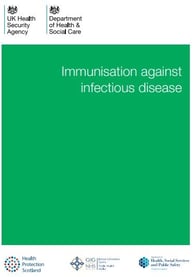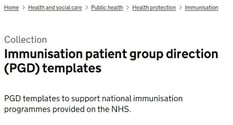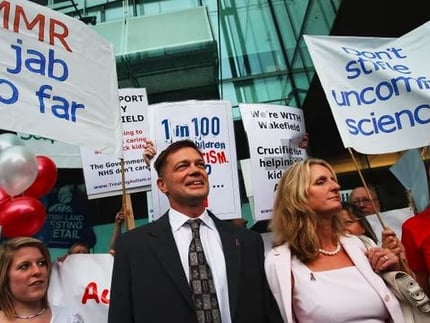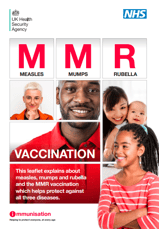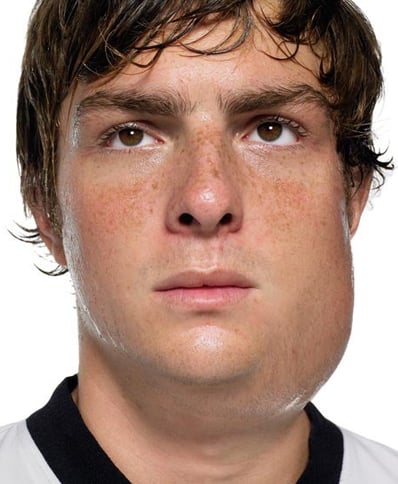Other useful links and further reading:
20th Jan 2025: Updates to the document MMR (measles, mumps, rubella) vaccine: advice for pregnant women
Mumps: epidemiology, surveillance and control: The characteristics, diagnosis and epidemiology of mumps. Includes immunisation information for health professionals and immunisation practitioners.
Vaccine uptake guidance and the latest coverage data
Laboratory confirmed cases of measles, rubella and mumps in England: April to June 2023
Sept 2024: Study shows gradual waning of MMR vaccine effectiveness over time. The waning is small, but may have significance, especially in under-vaccinated populations.
Recent Updates & News
30th April: A BIG update came along today - the 'changes to the routine childhood schedule letter'. Big read with lots of changes to absorb. I won't repeat it all here but do have a good read.... some of this relates to MMR scheduling on the childhood prog. (see UKHSA webinar link on news page in June and consider registering for more info). Expect Green Book updates, PGD changes and perhaps a small amount of chaos while we adapt to the changes. Keep calm and keep the kettle on....
The Green Book chapter was last updated in 2013! So instead of updates, we will have a history lesson.
We talk a lot about making sure people have two recorded doses of MMR, but lately the focus all seems to be on measles (and rightly so - it's a nightmare!). However there are things that could easily be overlooked when it comes to MUMPS!!
SO...
Quick vaccine history lesson from the Green Book:
In November 1994, to prevent a predicted epidemic of measles, children aged between 5 and 16 years were immunised with measles-rubella (MR) vaccine. At that time, insufficient stocks of MMR were available to vaccinate all of these children.
Fortunately in October 1996, a two-dose MMR schedule was introduced. A single dose of a mumps-containing vaccine used in the UK confers between 61% and 91% protection against mumps. Two doses are therefore needed for both individual and population protection.
However, in 1999, there was a considerable increase in confirmed mumps cases. Most of these cases occurred in adolescents or young adults who were too old to have been offered MMR when it was introduced in 1988 or to have had a second dose when this was introduced in 1996. They had not previously been exposed to natural mumps infection as children and so remained susceptible.
In late 2004, another increase in clinically diagnosed and confirmed mumps infections was observed. The vast majority of confirmed cases were in those born between 1980 and 1987 and outbreaks occurred mainly in universities.
Many of the individuals in the cohorts affected by mumps believed that they had been immunised with mumps-containing vaccine in the past. However, before 1988, there was no routine immunisation against mumps in the UK, and the campaign in 1994 used MR vaccine due to no availability of MMR. Some people may therefore have had two doses of measles-containing vaccine and one of rubella, but no mumps vaccine. Others have had only one dose of mumps vaccine in the MMR.
Moral of the story is to be CAREFUL with history-taking and assumptions!


The dangers of kissing eh?
28th Feb 2025: From GP contract 25/26 (varicella info included for context):
MMR programme schedule change and catch-up effective from 1st Jan 2026: Children turning 18 months on or after 01 January 2026 will receive their 2nd MMR dose at their new 18-month appointment. Children aged 18 months to 2 years 6 months on 01 January 2026 will be invited to a brought forward appointment for their 2nd MMR dose between 01 January 2026 and 31 October 2026. Children aged 2 years and 7 months to 3 years 4 months on 01 January 2026 will receive their 2nd MMR dose at their existing scheduled 3 years 4 months appointment before 31 October 2026.
Varicella introduction and catch-up (subject to final policy decision) effective from 1st Jan 2026: Children turning 12 months on or after 01 January 2026 will receive two doses of MMRV (at 12 and 18 months). Children turning 18 months on or after 01 January 2026 will receive one dose of MMRV (to complete their two-dose MMR schedule). Children aged 18 months to 3 years 4 months on 01 January 2026 will receive one dose of MMRV instead of their 2nd MMR dose. Of this cohort: those aged 18 months to 2 years 6 months will be invited to a brought forward appointment for their 2nd MMR dose (as MMRV) between 1 January 2026 and 31 October 2026. Those aged 2 years 7 months to 3 years 4 months on 1 January 2026 will receive their 2nd MMR dose (as MMRV) at their existing scheduled 3 years 4 months appointment before 31 October 2026. Children aged 3 years 4 months to less than 6 years will be invited for a universal single catch-up dose of MMRV. Appointments to be scheduled from 1 January 2026 and completed by 31 March 2027. Children aged 6 years to less than 11 years will be invited to receive a single dose of MMRV if they have no history of chicken pox. Appointments to be scheduled from 1 January 2026 and completed by 31 March 2027. From 1 April 2027, an opportunistic or on request offer will remain for varicella (as a single dose of MMRV) to all children aged 3 years 4 months to less than 11 years before 1 January 2026 who have no history of chicken pox.
MMR Vaccine & Autism claims:
Some findings from the literature
Here are some simple reassuring study findings taken from the Green Book if this becomes a topic of discussion in a consultation:
No increased risk of autism in children vaccinated with MMR compared with unvaccinated children (Farrington et al., 2001; Madsen and Vestergaard, 2004)
No clustering of the onset of symptoms of autism in the period following MMR vaccination (Taylor et al., 1999; De Wilde et al., 2001; Makela et al., 2002)
The increase in the reported incidence of autism preceded the use of MMR in the UK (Taylor et al., 1999)
The incidence of autism continued to rise after 1993, despite the withdrawal of MMR in Japan (Honda et al., 2005)
There is no correlation between the rate of autism and MMR vaccine coverage in either the UK or the USA (Kaye et al., 2001; Dales et al., 2001)
No difference between the proportion of children developing autism after MMR who have a regressive form compared with those who develop autism without vaccination (Fombonne, 2001; Taylor et al., 2002; Gillberg and Heijbel, 1998)
No difference between the proportion of children developing autism after MMR who have associated bowel symptoms compared with those who develop autism without vaccination (Fombonne, 1998; Fombonne, 2001; Taylor et al., 2002)
No vaccine virus can be detected in children with autism using the most sensitive methods available (Afzal et al., 2006).
The fake MMR claims that struck fear into generations of parents: Metro article
Have a google of Andrew Wakefield. This discredited doctor is one of the reasons we still see a lot of anxiety around MMR vaccines
This leaflet explains the measles mumps rubella (MMR) vaccine for all ages.
Bits and bobs to casually drop into conversation
Did you know....
According to the VKP:
Mumps virus can lead to a wide range of complications, some very serious. These include meningitis and encephalitis.
Before the MMR vaccine was introduced in 1988 (see history lesson above), more than 8 out of every 10 people in the UK developed mumps. Mumps used to cause about 1200 hospital admissions each year in England and Wales. It was the most common cause of both viral meningitis and acquired deafness in children.
After 2002 there was a big increase in confirmed mumps cases in the UK. This peaked in 2005, when there were over 40,000 cases of mumps in England and Wales. Smaller peaks occurred in 2009 (over 7500 cases) and 2013 (over 4000 cases). Most of the cases have been in teenagers and young adults who were too old to be offered the MMR vaccine when it was introduced in 1988, and also missed a second MMR dose when this was introduced in 1996. Many of the outbreaks have been in colleges and universities.
Around 1 in 3 people do not show any symptoms when they are infected. BUT THEY CAN STILL PASS IT ON!

